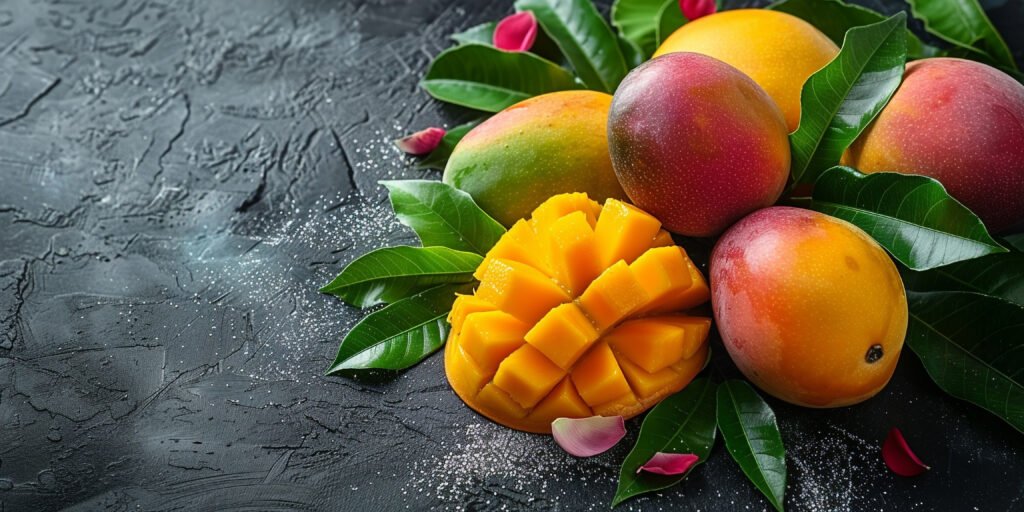A Mango is a kind of tropical fruit that is often and widely used in different sweet and savory dishes around the entire globe. It may be either green, yellow, orange, red, or a mixture or any of these colors, and has no color along with the yellow or orange flesh swelling over a flat, hard pit. The fruit is usually cut off the pit and peeled before it can be used. A mango can be consumed raw unripe or ripe, or boiled into desserts, curries, and chutneys. Despite being a moderate-priced commodity per fruit, there are many varieties that are heavy and large. It is also a widely consumed dried fruit.
Benefits of Mango:-
Low In Calories:-
Another benefit of mango is that it’s low in calories.One cup (165 grams) of fresh mango contains fewer than 100 calories and has a very low calorie density, meaning that it has few calories for the volume of food it provides.In fact, most fresh fruits and vegetables tend to have a low calorie density. One study found that consuming fresh fruit like mango at the start of a meal could help keep you from overeating later on in the meal.Still, keep in mind this may not be the case for dried mango. Just 1 cup (160 grams)of dried mango contains 510 calories, 106 grams of sugar, and a higher calorie density.Though dried mango is still rich in nutrients like vitamins, minerals, and antioxidants, it may be best to consume it in moderation due to its high calorie density and sugar content.
It Can Help Prevent Diabetes:-
Fresh mango is relatively high in natural sugar compared to other fresh fruits, containing more than 22 grams per cup (165 grams).You might think that this could be a concern for people living with metabolic disorders such as diabetes, or for those trying to limit their sugar intake.However, no evidence suggests that eating fresh foods leads to diabetes or is bad for the health of people with the disease.In fact, several studies have even linked a higher consumption of fresh fruit to an overall lower risk of diabetes.Little research has examined the specific link between fresh mangoes and diabetes. However, one study found that people who added 10 grams of freeze-dried mangoes to their diet every day for 12 weeks experienced significant improvements in blood sugar levels.Another recent study concluded that eating fruits and vegetables rich in vitamin C and carotenoids can help prevent the onset of diabetes. Mangoes are rich in both of these nutrients, so they may offer similar benefits, although more research is needed.However, because the mango is rich in natural sugars, it can cause an increase in blood sugar levels if you eat too much in one sitting.Therefore, it may be best to consume mangoes in moderation, meaning a typical serving of about 1 cup (165 grams) at a time. It can also be useful to combine it with other foods rich in fiber and protein, because this can help limit blood sugar spikes.
Promotes Heart Health:-
Mango contains nutrients that support heart health.For example, it contains magnesium and potassium, which help maintain good blood circulation. These nutrients help your blood vessels relax, promoting lower blood pressure.Mangiferin, a super antioxidant found in mangoes, also appears to benefit heart health.Animal studies have shown that mangiferin can protect heart cells against inflammation, oxidative stress and cell death. It can also help lower blood cholesterol, triglycerides, and free fatty acids.Although these results are promising, research on mangiferin and heart health in humans is currently lacking. Therefore, more studies are needed.
It Can Help Maintain Healthy Skin And Hair:-
Mangoes contain reasonable levels of vitamins A and C. Vitamin C helps form collagen, the protein that acts as a scaffold for the skin, keeping it plump and firm. Vitamin C is one of the most important antioxidants, which play a protective role against environmental damage; Vitamin C deficiency can affect wound healing and increase fine lines and wrinkles. Our hair also needs vitamin C for collagen production and to help absorb iron, an important mineral needed for hair growth.All cells need vitamin A for growth, including skin and hair, and some studies suggest that it may offer potential protective effects against the signs of aging. One of the main roles of vitamin A is its involvement in the production of sebum, the fatty substance that moisturizes our skin and scalp.
Protection Against Free Radical Damage:-
Free radicals are compounds linked to many chronic diseases and aging in general. The high levels of antioxidants, including beta-carotene and vitamin C, found in mangoes help protect cells from free radical damage.They are also a source of phytochemicals, which are plant-derived compounds known for their health-promoting properties. Specific phytochemicals found in mangoes, including phenolic acids, mangiferin, carotenoids and gallotannins, have been linked to anti-inflammatory effects.anti-diabetic, anti-obesity and anti-cancer drugs.
It Can Reduce The Risk Of Cancer:-
Mango pulp contains carotenoids, ascorbic acid, terpenoids, and polyphenols that are believed to have cancer-preventing properties . Mangoes are also found to contain unique antioxidants that are lacking in other fruits and vegetables. A study conducted by the University of Texas found that polyphenols in mangoes have anticancer effects that can help reduce oxidative stress(oxidative stress can increase the risk of chronic diseases such as cancer).The anti-cancer properties of mangoes are also attributed to mangiferin, a compound found mainly in the fruit. Another rat study conducted in 2015 found that mango polyphenols can suppress breast cancer. Mangiferin has also been shown to inhibit the growth of colon and liver cancer cells.A rat study conducted by the Industrial Toxicology Research Center found that lupeol, a triterpene found in mangoes, can help fight prostate cancer. Animal studies have also shown that the polyphenols found in mango prevent tumor growth in breast cancer.
May Promote Brain Health:-
Mangoes provide vitamin B6. So, vitamin B6 is thought to have a positive impact on brain health when consumed together with other foods that are good sources of vitamin B6. Certain studies have indicated that insufficient B6 may be a contributing factor in the development of depression and seizures. Thus, mangoes can serve as a mood enhancer as well as provide the body with energy.A study carried by the Ram-Eesh Institute of Vocational and Technical Education stated that the extracts of mango are composed of some principles that could improve memory. In addition, a study conducted in Thailand revealed that mango extracts can protect against mild cognitive impairment.Nonetheless, we require additional investigations to thoroughly analyze the cognitive advantages of mangoes.




